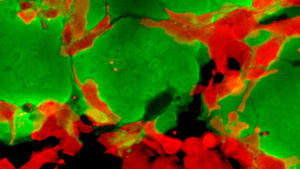 Oncolytic viruses for targeted attack on cancer stem cells generatedhttp://www.idw-online.de/de/news513811
Oncolytic viruses for targeted attack on cancer stem cells generatedhttp://www.idw-online.de/de/news513811Dr. Susanne Stöcker Presse, Informationen
Paul-Ehrlich-Institut - Bundesinstitut für Impfstoffe und biomedizinische Arzneimittel
0Upon infection with the CD133-specific measles virus CD133-positive tumour cells (green) die off, leaving holes in the cell layer a few hours later. Even directly adjacent CD133-negative cells (red) are protected from infection.Scientists at the Paul-Ehrlich-Institut (PEI) have successfully created oncolytic viruses which effectively target CD133-positive cancer stem cells to infect and kill them. In animal experiments, multiple tumour foci could be completely eradicated. Cancer Research reports on the results of this research in its online edition of 4th January (Friday afternoon).
Tumours do not consist of homogenous cell populations but contain cancer stem cells which respond poorly to chemotherapy and radiotherapy and are considered to be responsible for metastatic tumours. Scientists have therefore stepped up their efforts to find ways of identifying and eliminating these "tumour-initiating cells".
The cell surface protein CD133 is currently discussed as a characteristic marker for such cancer stem cells. The PEI President’s Research Group "Molecular Biotechnology and Gene therapy" led by Professor Christian Buchholz has modified an attenuated and thus innocuous measles virus for the targeted attack on cancer stem cells. The modified virus requires the surface protein CD133 as receptor for penetration into the cell. The scientists were able to prove that the modified virus infects only CD133-positive tumor cells even when these are cultivated in close contact with CD133-negative cells.
In collaboration with Heidelberg University and the German Cancer Research Center (Deutsches Krebsforschungszentrum, DKFZ), the Paul-Ehrlich-Institut’s scientists tested the anti-tumoural effect of their targeted virus using mouse models reflecting glioma, colon carcinoma, and liver cancer. The modified virus showed pronounced anti-tumoural activity in all animal models tested – the tumour growth was substantially reduced or even entirely suppressed. The scientists compared the effectiveness of their modified oncolytic measles virus with that of an oncolytic measles virus currently investigated in clinical trials which does not show any specificity for subtypes of tumour cells. "We were surprised that the CD133-specific virus showed an anti-tumoural activity which was at least as good as that of the standard virus. In the liver cancer model, the anti-tumoural activity was clearly superior and led to complete tumour remission", said Professor Buchholz. In further studies, the research team aims at elucidating why their viruses turned out to be more effective in fighting tumours than conventional oncolytic viruses which are supposed to attack all tumour cell subtypes.
Is it really only cancer cells that are attacked by the CD133-specific virus? In fact, not only cancer stem cells bear the surface marker CD133 but also haematopoietic stem cells. Yet, haematopoietic stem cells were not attacked by the oncolytic measles virus. This is due to the innate immunity of these cells, which protects them from an attack by measles virus. Many tumour cell types exhibit a defect in innate immunity allowing the virus to replicate unimpaired.
One advantage of the use of oncolytic viruses in cancer therapy is their enhancer mechanism. Infected tumor cells produce progeny virus particles which are released upon cell lysis and are able to detect further tumour cells.
Personal note: experts who study how vitamin D works on cancers recommends 5000IU a day...
http://www.vitamindcouncil.org/health-conditions/cancer/http://www.naturalnews.com/032202_vitamin_D_deficiency_disease.html








 http://en.wikipedia.org/wiki/Aloe_vera
http://en.wikipedia.org/wiki/Aloe_vera







